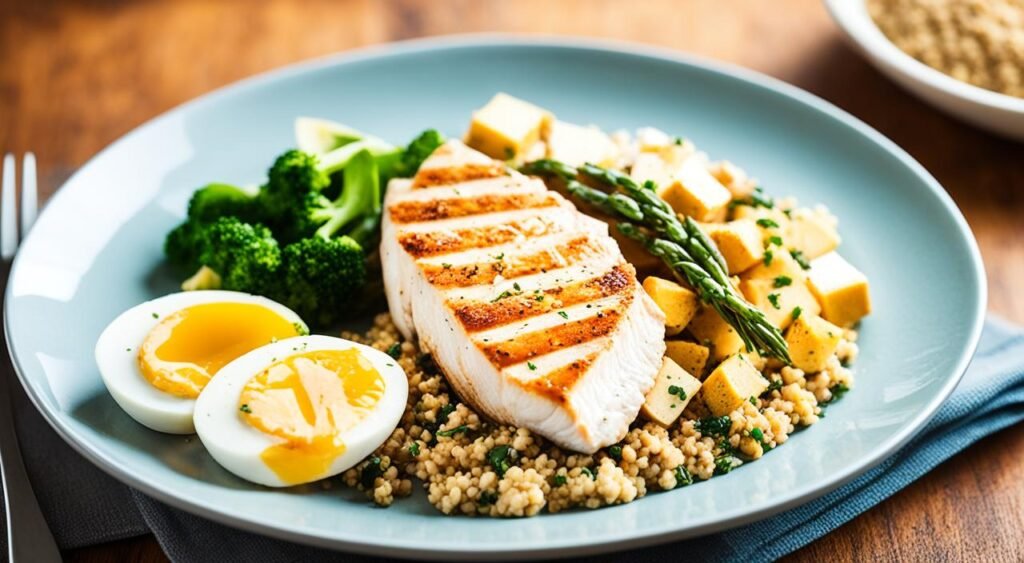Protein is crucial for our body’s structure and function. Adult men should eat 56 grams (g) of protein each day. For women, it’s 46 g. But, having more protein than needed might help with weight and muscle gain.
A diet high in protein means getting more of your calories from protein sources. These include lean meats, poultry, fish, eggs, dairy, legumes, nuts, and soy. It can aid in feeling full, which may cut down on how much we eat. Protein also uses up more energy to digest, helping burn more calories. So, you might lose weight and improve your body shape.
Getting enough protein is key for building and keeping muscle. The amino acids in protein help build muscle tissue. Boosting protein can start new muscle growth. This increases muscle size and strength, perfect for those into bodybuilding or lifting.
Key Takeaways
- Protein is a crucial macronutrient for maintaining and building muscle mass.
- A high protein diet can boost feelings of fullness and increase metabolism, potentially aiding in weight loss and fat loss.
- Adequate protein intake is necessary for muscle protein synthesis, which is the process of creating new muscle fibers.
- High protein diets can be beneficial for individuals engaged in strength training or bodybuilding.
- Protein sources can come from both animal-based and plant-based options.
Introduction to High Protein Diets
Protein is key for our body and has many important tasks. It helps our muscles, bones, and skin stay strong. It also makes enzymes, antibodies, and hormones. So, a diet high in protein can do more than just help you get stronger.
Understanding the Role of Protein in the Body
Amino acids are the body’s building blocks found in protein. Our bodies turn protein from food into these amino acids. Then, it uses them to repair and grow cells, like in our muscles and organs. Having enough protein is vital for health and all our body’s jobs.
Benefits of a High Protein Diet
- It makes you feel fuller, helping with weight loss.
- It boosts your metabolism, which burns calories more efficiently.
- This diet can help you lose fat but keep your muscles strong.
- You will see better muscle growth and recovery, perfect for athletes.
- It also improves your bone health, lowering your risk of osteoporosis.
- This diet helps you heal from wounds quicker and supports your immune system.
- It regulates your hormones, which affects your body in many ways.
Knowing how protein works can guide your choices for a healthy life. This includes picking foods that support your health and fitness.
Protein Requirements for Muscle Building
Many people aim to grow their muscles, from bodybuilders to anyone wanting to get fitter. The protein needed for this varies. It depends on your weight, age, sex, and how much muscle mass you have.
The Recommended Dietary Allowance (RDA) suggests having 0.8 grams of protein per kilogram of body weight. If you weigh 150 pounds (68 kg), that’s about 54 grams of protein a day. But studies show eating more protein, from 1.2 to 2 grams per kilogram, is great for building muscle, losing weight, and staying healthy.
Age and how active you are also play a part in how much protein you need. Athletes, bodybuilders, and older adults might need more protein. They often have more muscle mass and use protein quicker. This means they need more protein to keep their muscles strong.
| Factors | Recommended Protein Intake (grams per kilogram of body weight) |
|---|---|
| General population | 0.8 – 1.2 |
| Endurance athletes | 1.2 – 1.6 |
| Strength-trained individuals | 1.6 – 2.2 |
| Older adults | 1.2 – 1.5 |
Knowing your protein needs helps you create a diet that matches your fitness aims. It supports overall health, too.
“Adequate protein intake is essential for muscle growth and repair, and it can also play a role in weight management and overall health.”
Sources of High-Quality Protein
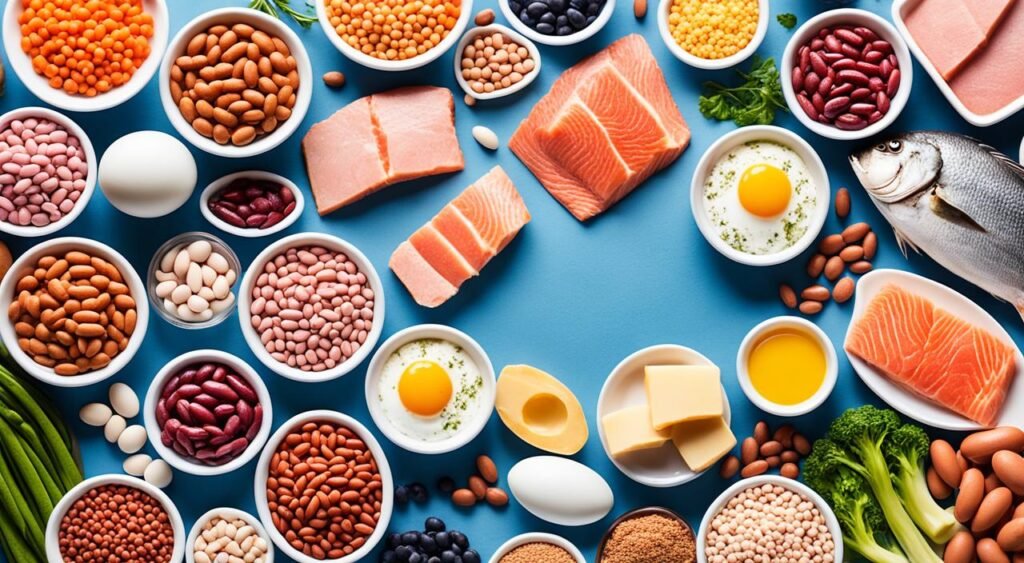
For building muscle and staying healthy, the type of protein matters as much as how much you eat. You can get good protein from animals and plants. Each type has its benefits.
Animal-Based Protein Sources
Meats, poultry, fish, eggs, and dairy are complete proteins. They have all the key amino acids for strong muscles and repair. These foods are rich in nutrients. Plus, your body can use their proteins easily, unlike plant sources.
- Lean Meats: Beef, pork, and lamb can be excellent sources of high-quality protein, as long as you opt for leaner cuts. This helps you avoid too much saturated fat.
- Poultry: Chicken and turkey breast are low in fat and big on protein. They’re great for building muscles.
- Fish: Fish like salmon, tuna, and mackerel are not just high-quality protein but also heart-healthy. They’re packed with omega-3s.
- Eggs: Eggs are a powerful source of nutrient-dense protein. They have all the amino acids your body needs.
- Dairy: Milk, yogurt, and cheese offer high-quality, animal-based protein.
Plant-Based Protein Sources
Plant foods aren’t always complete proteins by themselves. But they’re still key for a balanced diet rich in protein. Mixing different plant-based protein sources ensures you get all the necessary amino acids.
- Soy: Tofu, tempeh, and edamame are top choices. They’re packed with plant-based protein and can replace meat easily.
- Legumes: Beans, lentils, and peas are top sources of high-quality, plant-based protein.
- Nuts and Seeds: Foods like almonds, walnuts, chia seeds, and flaxseeds have plant-based protein along with healthy fats and fiber.
- Grains: Quinoa, brown rice, and oats offer lots of protein as plant-based options for your meals and snacks.
Adding both animal-based and plant-based protein to your meals helps get all essential amino acids. This supports muscle growth and health overall.
“A balanced, high-protein diet that includes both animal-based and plant-based options is the key to building and maintaining muscle mass.”
Timing of Protein Intake
When you eat protein affects how your muscles grow and recover. Eating protein before a workout gives muscles what they need to grow while exercising. After a workout, protein helps muscles repair and grow by refilling glycogen stores.
Protein Intake Before and After Workouts
It’s smart to eat high-quality proteins, like whey or plant blends, before and after working out. This boosts the diet’s muscle benefits. Pre-workout protein aids workout performance and muscle recovery. Post-workout, it supports muscle growth and recovery.
Getting the right time to eat protein is key. It’s crucial for a high protein diet’s success. Knowing when to eat supports muscle growth and recovery with pre-workout and post-workout meals.
| Protein Intake Timing | Potential Benefits |
|---|---|
| Before Workout |
|
| After Workout |
|
“Consuming protein before and after a workout can have a synergistic effect on muscle building and recovery, optimizing the benefits of a high protein diet.”
High Protein Diet and Weight Loss
A high protein diet can really help with losing weight. It makes you feel full longer and curbs your appetite, which can lead to eating less. This makes sticking to a diet with fewer calories easier, helping you lose weight and keep it off.
Eating a lot of protein can also make your body burn calories faster. This is because digesting protein uses up more energy than digesting carbs or fats. So, a diet high in protein could boost how many calories your body burns, aiding in weight loss.
A high protein diet isn’t just about eating less. It also helps keep your muscles strong when you’re losing weight. This is vital for staying healthy as you slim down. Adding in some weight training while you eat lots of protein can mean that most of your weight loss comes from shedding fat, not muscle.
Some people find success with losing weight on a high protein, low-carb diet that leads to ketosis. Ketosis is when your body turns to burning fat for energy because it doesn’t have as many carbs to use. This can help you lose more weight and improve how your body is shaped.
| Mechanism | Effect on Weight Loss |
|---|---|
| Appetite Suppression | Reduces calorie intake |
| Increased Metabolic Rate | Boosts energy expenditure |
| Muscle Preservation | Maintains lean muscle mass |
| Ketosis | Shifts metabolism to fat burning |
Using these different ways, a high protein diet can work really well for weight loss that lasts.
Combining Protein with Other Nutrients
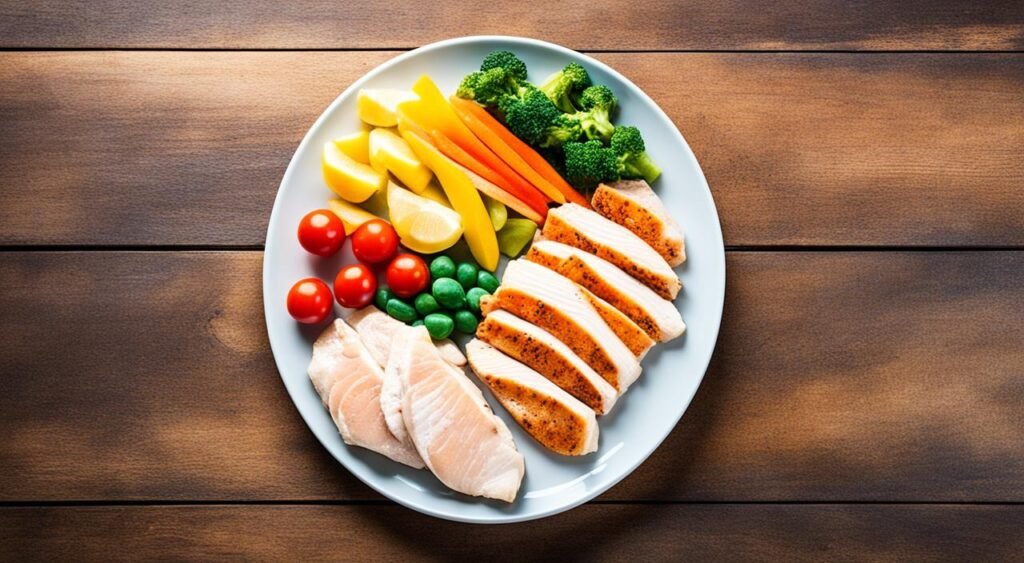
When following a high-protein diet, a balanced approach is crucial. Protein is vital for muscle growth and weight control. But, it’s not enough on its own for a healthy diet. By adding healthy carbs, fats, fiber, vitamins, and minerals, you get a nutritious plan. This supports your health and how well you do in sports.
Add whole grains, fruits, and unsaturated fats to your protein meals. This boosts the good a high-protein diet can do. Carbs give you energy, fats help make cells and hormones. Fiber keeps your gut healthy. Vitamins and minerals help all kinds of body functions. They’re important for your immune system and bones, among other things.
| Nutrient | Benefits | Good Sources |
|---|---|---|
| Carbohydrates | Provide energy, support brain and muscle function | Whole grains, fruits, vegetables |
| Healthy Fats | Support cell function, hormone production, and heart health | Avocados, nuts, seeds, olive oil |
| Fiber | Promote digestive health, help with feelings of fullness | Vegetables, fruits, whole grains, legumes |
| Vitamins and Minerals | Contribute to immune function, bone health, and overall well-being | Fruits, vegetables, lean meats, dairy |
Keeping a good mix of protein and other nutrients is key. Then, you get the best from a high-protein eating plan. It helps your wellbeing and your sports performance. This way of eating makes sure your body gets all the good stuff it needs.
“A high-protein diet is most effective when it is part of a well-rounded, nutrient-dense eating plan.”
To succeed with a high-protein diet, find the right mix. With some thought and effort, you can create a meal plan that’s great for your health and fitness goals.
High Protein Diets for Vegetarians and Vegans
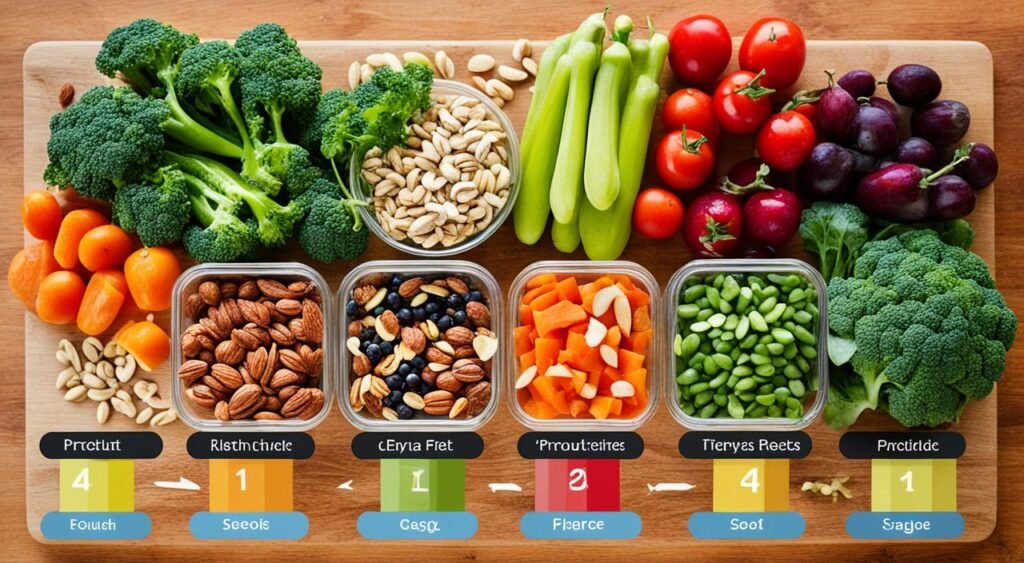
Folks who follow a vegetarian or vegan diet can get a lot of protein. They just need to watch where their protein comes from. Foods like soy, legumes, nuts, and grains are great sources. However, they might not have all the amino acids like animal protein does.
Vegetarians and vegans can mix different plant proteins to get all the amino acids they need. They can also use protein powders or other rich foods. It’s key to plan their meals carefully and make sure they’re getting all the nutrients they need.
Protein Combining and Complementary Proteins
One smart way vegetarians and vegans can get all their protein is by combining foods. For instance, combining grains with legumes forms a complete protein. This way, they get all the essential amino acids.
- For instance, rice and beans together make a full set of proteins.
- Eating different plant proteins across the day can also cover all amino acid needs.
Supplementing for Vegetarians and Vegans
Even though plants are good protein sources, some may need more. For extra protein, vegetarians, and vegans might opt for protein powders or other supplements. These help with muscle growth and recovery.
| Protein Source | Protein Content (per serving) |
|---|---|
| Soy Protein Powder | 24g |
| Pea Protein Powder | 20g |
| Hemp Protein Powder | 15g |
| Spirulina | 4g |
By mixing up plant protein sources and possibly adding supplements, vegetarians and vegans can reach their protein targets. This helps support their health and muscle growth goals.
Potential Risks of High Protein Diets

High protein diets help build muscle and aid in weight loss. But, they come with some risks. Eating a lot of protein, especially from animals, can hurt the kidneys. This is especially true for people with kidney issues.
High Protein Diets and Kidney Health
The kidneys clean our body’s waste, including protein leftovers. Too much protein means the kidneys work harder. This raises the risk of kidney stones. People with kidney problems or those who had kidney stones before should be careful.
Drinking lots of water is key to protecting your kidney health on a high protein diet. It helps the kidneys by making your pee less concentrated. This way, the kidneys don’t have to work as hard.
| Potential Risks of High Protein Diets | Mitigation Strategies |
|---|---|
| Increased burden on the kidneys | Ensure adequate hydration and consult with a healthcare professional |
| Increased risk of kidney stones | Maintain proper hydration and limit intake of processed meats and high-sodium foods |
| Nutrient deficiencies from carbohydrate restriction | Incorporate a variety of nutrient-dense plant-based foods and consult with a registered dietitian |
| Increased risk of heart disease from high saturated fat intake | Choose lean protein sources and limit intake of high-fat animal products |
Always talk to a registered dietitian or a doctor before starting a high protein diet. They can make sure it’s safe and help avoid possible problems, like nutrient deficiencies. This is especially true if you have health issues or plan to stay on the diet long.
“It’s important to be mindful of the potential risks associated with high protein diets and work closely with a healthcare professional to ensure the diet is tailored to your individual needs and health status.”
Protein Supplements: Pros and Cons
Do you want to up your protein intake? Protein supplements, like whey, casein, and plant-based powders, can help. They’re great for folks aiming to boost or keep muscle. Whey protein is perfect for quick muscle support, while casein helps with slower muscle repair. Plant options, made from soy, pea, or blends, are ideal for vegetarians and vegans.
But, be cautious about the protein’s quality, safety, and possible side effects. Unlike food, protein supplements aren’t monitored as strictly. It’s wise to chat with a healthcare expert or a diet pro. They can guide you on adding the right type and amount of protein to your high-protein menu.
Pros of Protein Supplements
- Easy way to amp up protein for better muscles and recovery
- Whey protein gets to work fast, boosting muscle growth
- Casein protein helps with slower muscle fix
- Choices for those who avoid animal products
Cons of Protein Supplements
- They’re not watched over as much as food
- There may be worries about quality, safety, and side effects
- It’s best to talk to a health professional for picking what’s right
Protein supplements are handy for high protein diets. But, it pays to think about their pluses and minuses. Always get advice from a pro before using them to build muscle or manage weight.
| Protein Supplement | Absorption Rate | Muscle Building | Muscle Recovery |
|---|---|---|---|
| Whey Protein | Fast | High | Moderate |
| Casein Protein | Slow | Moderate | High |
| Plant-Based Protein | Moderate | Moderate | Moderate |
“Protein supplements are a good support, but they can’t replace a healthy diet. Always check with a healthcare pro to use them safely and correctly.”
Designing a High Protein Meal Plan
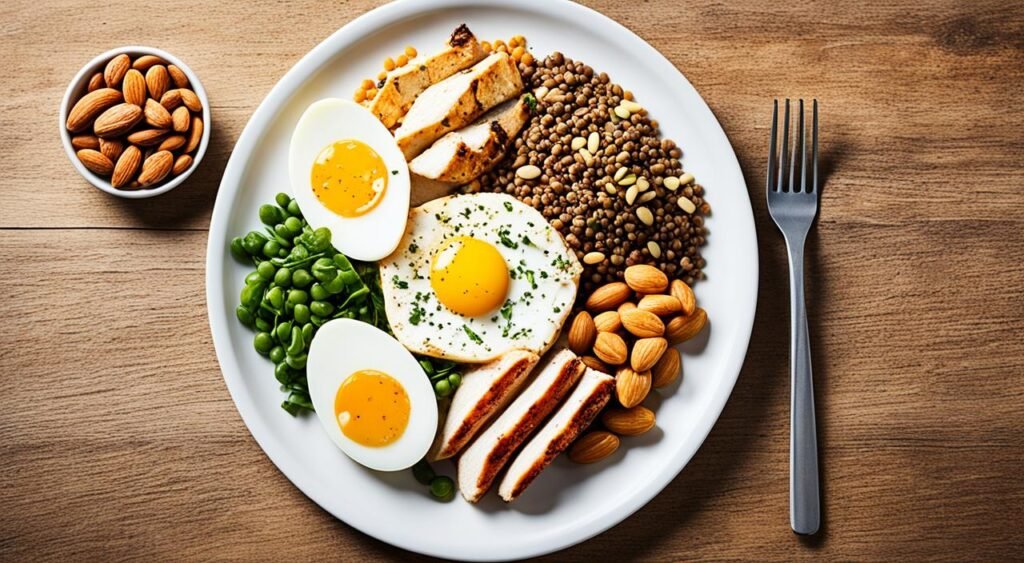
When you make a high protein meal plan, it’s key to use various lean proteins. This ensures your diet is balanced and full of nutrients. Think poultry, fish, eggs, dairy, and plant-based choices like soy and nuts. Including a wide selection of protein-rich foods helps your muscles grow and keeps you healthy overall.
Sample High Protein Meals
Here are some high protein meal suggestions to boost your fitness:
- Grilled chicken breast with quinoa and roasted vegetables
- Baked salmon fillet served with sweet potato and sautéed spinach
- Vegetarian chili made with lean ground turkey and beans, topped with avocado
- Greek yogurt parfait with fresh berries and a sprinkle of nuts or seeds
High Protein Snacks for Muscle Building
Don’t forget about high protein snacks for building muscle. A few good choices include:
- Hard-boiled eggs
- Protein-rich smoothies made with Greek yogurt, protein powder, and fruit
- A handful of mixed nuts or seeds
- Cottage cheese with fruit and a bit of honey
When planning your high protein meals, keep an eye on how much you eat. Also, consider your personal calorie and macronutrient requirements. Talking to a dietitian or nutritionist can guide you in making a plan that fits your fitness goals and health.
| Protein Source | Serving Size | Protein Content (g) |
|---|---|---|
| Grilled Chicken Breast | 4 oz (113g) | 26g |
| Salmon Fillet | 3 oz (85g) | 17g |
| Eggs (1 large) | 1 egg | 6g |
| Greek Yogurt (non-fat) | 1 cup (240g) | 23g |
| Lentils (cooked) | 1 cup (198g) | 18g |
| Almonds (dry roasted) | 1 oz (28g) | 6g |
“A well-designed high protein meal plan can be a powerful tool for supporting muscle growth and overall health.”
High Protein Diet
A high protein diet is great for those wanting to gain muscle, shed weight, or get healthier. Eating lots of good protein from various sources helps your muscles grow and fix themselves. This also speeds up your metabolism and makes you feel full longer.
Pair these proteins with complex carbs, healthy fats, fruits, and veggies. This mix makes for a balanced diet. If you work out while eating this diet, you’ll likely reach your fitness goals. These can include getting stronger, losing weight, and a faster metabolism.
- Incorporate a variety of lean protein sources like chicken, turkey, and eggs into your diet.
- Add plant-based protein like beans and tofu to mix up your protein sources.
- Use protein supplements such as whey for added support in your fitness goals.
- Combine your proteins with complex carbs, healthy fats, and fiber for a balanced nutrition plan.
“A high protein diet can help with muscle building, weight loss, and health. But, do it right by choosing nutrient-rich foods. Then, balance it with a good overall diet.”
Adding a high protein diet to your life helps with fitness goals and boosts your metabolism. It brings many health benefits. Always check with a doctor or dietitian to match your dietary guidelines.
Also Read: Efficient Low-Carb Diet Plan for Healthy Living
Conclusion
A high protein diet is great for those aiming to gain muscle or lose weight. It helps build and repair muscles, speeds up metabolism, and keeps you feeling full. This diet relies on foods like lean meats, fish, eggs, and plants.
This approach works best when paired with a diet full of different essential nutrients. It can help meet fitness and health targets. Yet, it’s wise to talk to a health expert or dietitian. They can guide you, especially if you have health issues or plan to follow the diet long term.
Choosing a diet high in protein boosts several aspects of health. It supports gaining lean muscle, managing weight, and increases metabolism. Adding varied protein-rich foods like lean meats, plants, and even supplements helps round out nutrition. This supports a healthier, balanced life.
FAQs
What is the role of protein in the body?
Protein is essential for our body because it helps in building and repairing our organs. It plays a part in maintaining our muscles, bones, and skin. It also makes enzymes, antibodies, and hormones we need.
What are the benefits of a high protein diet?
A high protein diet keeps you feeling full and helps you burn calories fast. It keeps your muscle strong while losing fat. This diet is great for building more muscle, keeping your bones strong, and healing wounds faster.
How much protein do I need for muscle building?
How much protein you need for building muscle depends on things like your age and how active you are. The general rule is 0.8 grams for every kilogram you weigh. For better muscle growth and health, up to 2 grams per kilogram could help.
What are the sources of high-quality protein?
Good protein comes from both animals and plants. Meat, fish, eggs, and dairy are rich in complete proteins. This means they have all the vital amino acids. Plant foods like soy and nuts are also good but usually need to be mixed for a complete amino acid profile.
When is the best time to consume protein for muscle building?
Eating protein before and after working out is good for your muscles. It gives your body what it needs for exercise and helps after to repair your muscles. Whey, casein, and some plant proteins are great for this.
How can a high protein diet help with weight loss?
High protein foods make you less hungry and reduce how much you eat. They also help burn more calories and keep your muscles. This can change how your body looks, keeping more muscle as you lose fat.
Can vegetarians and vegans follow a high protein diet?
Yes, those on veggie or vegan diets can get plenty of protein. It’s easier with care to make sure they eat diverse plant sources. This ensures they get all the amino acids they need for muscle repair and growth.
Are there any potential risks of a high protein diet?
Having too much protein, especially from meat, can strain your kidneys. It might worsen any existing kidney problems. Also, too much processed meat can harm your heart. And, not enough carbs can lead to missing important nutrients if not careful.
What should I consider when choosing protein supplements?
Protein powders help those needing more protein, like athletes. Whey helps build muscle fast. Plant proteins can be better for some people. But always check the quality and any possible health effects, as they’re not as tightly controlled as food.
How can I design a high protein meal plan?
To design a good protein meal plan, mix lean meats, fish, eggs, dairy, and plant proteins. Add healthy carbs, fats, and lots of fruits and veggies. Include meals like chicken with quinoa, salmon with sweet potato, or chili with beans. For snacks, try yogurt with fruit, eggs, smoothies, or nuts.
Source Links
- https://www.healthline.com/nutrition/high-protein-diet-plan
- https://www.webmd.com/diet/ss/slideshow-high-protein-diet
- https://www.mayoclinic.org/healthy-lifestyle/nutrition-and-healthy-eating/expert-answers/high-protein-diets/faq-20058207
